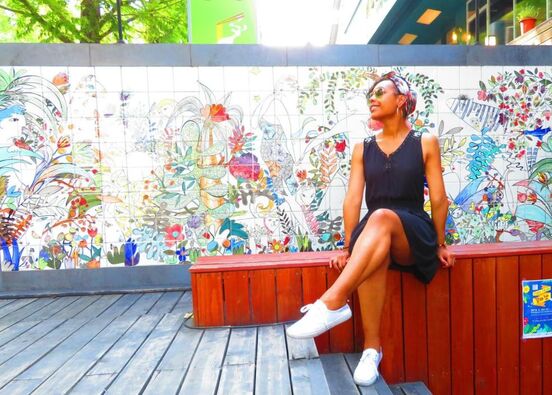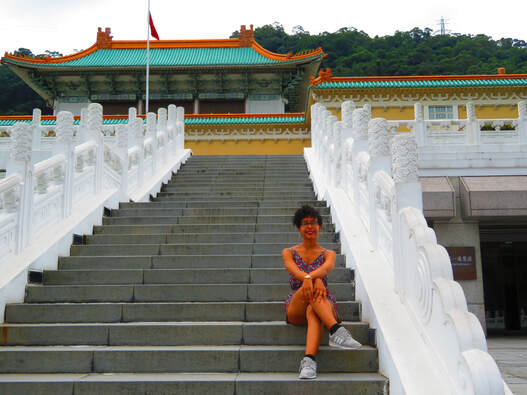|
Writer's Note: Before reading any further, there is one thing I have to stress -- my experience is not a reflection of the entire Korean society, nor is it comparable to the experience of every other black woman living in Korea. If you can relate to my story, I'm glad to be the one to reassure you that you're not alone; if you're thinking of coming to Korea, I hope this helps you in your journey; if this story is the complete opposite of your experience, I relish in your affirmative impression of living in South Korea. I moved to South Korea in February 2017, and after 2 and a half years I can honestly say it has been a learning experience. One of the challenges I did not anticipate was how daunting the experience would be on my identity as a black, Caribbean-American, woman. I first decided to move to Korea after becoming familiar with the popular culture -- and binging a few K-dramas on Netflix. Then, I went on a spontaneous trip to Seoul with one of my best travel buddies and had a blast! And that settled it. I applied for a teaching position, bought myself a ticket, and was gone. At this time, I was a young impressionable twenty-five year old, so I don't blame Korean standards for all of the insecurities I felt during my first year living in South Korea. "The one thing no one ever explained to me about culture shock is that there are two common ways people handle it: conform, or retreat." I lugged my huge purple suitcases through the door of my new abode -- an old half-furnished 2-bedroom apartment. I crept my foot onto the squeaky vinyl floorboards and entered my new room that contained an overbearingly green mattress that dipped in the middle; a misshapen discolored desk that scratched the floor because of a missing wheel; and a gray box they called a T.V. I was disappointed to say the least, but I thought at least it was my own space, I could make it my own. The only problem with that was I didn't even know how to define myself, let alone make a whole new space "my own" in a country where I was obviously foreign. It quickly dawned on me that I now had the standards I set for myself along with a list of standards set by a society I just inserted myself into. In other words, I did not know how to fit in. The one thing about culture shock that no one ever explained to me is that there are two common ways people usually go about handling it: conform, or retreat. My first reaction was to conform. We all know that saying, "When in Rome do as the Romans do," so I figured in Korea, let's do what's expected of us in their country. My freedom as a woman was one part of my identity that was immediately compromised. Growing up in the USA, I have had my fair share of microaggressions and prejudices due to my gender; however, I never really felt like I had to play a role due to my gender until I moved to South Korea. One thing that was definitely a shock for me was how practiced their roles were, and I am not saying it's a bad thing, BUT it's something that I learned was something I could never accept for myself. I would describe myself as a more laid back person who cares about her appearance, but am not fixated on things like fashion or cosmetics. According to the New York Times, South Korea "has the world’s highest rate of cosmetic surgery per capita, and it keeps rising. The beauty market — cosmetics and facial care products like masks — generated $13 billion in sales last year...making it one of the world’s top 10 beauty markets." Being a person like me, stepping into a society that highly regards a specific type of beauty was more than a little intimidating. Sure I know I'm beautiful -- everyone is -- but when I come into work bare-faced with a cardigan and jeans, while others wear dresses and flawless make up, it's a bit of an understatement to say I was a diffident co-worker. And unfortunately, this followed into my daily life, so I conformed. My hair was always straightened due to the anxiety that came along with the speculative comments I'd receive from students and colleagues; I wore dresses and skirts more often to appear more feminine; I wore BB cream and light pink lipstick everyday to achieve that naturally pretty and cute Korean aesthetic. It lasted all of three months. Although that seems like a short amount of time, when you're living somewhere new and all of your experiences are a first, three months feels like a long time. I honestly felt like the only time I could be myself was when I stripped myself of the clothes and make up. The only place that saw the real me was my bedroom. When I was out with friends, I tried not to dance too promiscuously because Korea is more conservative. When my friends told a joke, I didn't laugh too loud. And although this may seem like I was just being considerate of the Korean culture, I felt restricted. I was in the middle of my quarter-life crisis -- a period of growth and transformation -- but these standards I put on myself were stunting. So, I let go. That August, I chopped off my heat-damaged ends, and wore what I felt like wearing -- of course still considering professionalism and the conservative environment. If I felt like wearing make up, then I did. If I woke up tired and didn't bother, then that was okay, too. Walking into work with my natural hair, bare-faced, and dressed down (in comparison to others -- I felt pretty dressed up) no one reacted as negatively as I expected. There were some ambiguous comments like, "Wow, what a special haircut..." There were some ignorant comments like, "Woah! Hip-hop style!" But most were positive like, "I love your hair! It really suits you." "My hair was always straightened due to the anxiety that came along with the speculative comments I'd receive from students and colleagues..." I had to remind myself of where I come from and who I am. My Trinidadian family taught me to dance with a sway in my hips; my American friends showed me how to express my joy with a huge grin and a belching laughter; my culture did not need to be hidden in order to enjoy life in Korea.
Two years later, and I'm still residing in South Korea, but I am more aware and confident in who I am than I was before. Existing in a place that is unfamiliar can be very taxing, but if you invest in yourself and take the time to understand yourself, then it can be a very rewarding experience. Living in a country where I felt completely different in most spaces, I was able to evaluate what parts of me are valuable and make me who I am; what shapes my identity and cannot be compromised. Some people completely transform themselves to fit into South Korean standards, while others completely disregard the Korean culture and just live as if they were still in their native country. To be honest, I don't think I'm a person who can say what is right, and what is wrong, but for me the best thing was trying to find a balance. In the end, it's turned into an everyday task of trying to maintain my own identity and respect the culture that I live in. It's hard, but worth it. When I enter my classroom, my students see me as I am, and respect me for who I am and my differences. I respect my colleagues for who they are and their differences. I am not Korean, and I don't need to be to live in this beautiful country. Most of the people around me aren't black, Caribbean, or American, and they don't have to be for us to have a connection. Living in Korea has been such a pleasure because I have the power to create a narrative for people who look like me, and I can share my customs, values, and identity with those who may know nothing about it. And just the same, my ignorance of South Korean culture, politics, and society shrinks because I am still willing to learn. Have you traveled or lived in a place where you've felt like an outsider? Have you ever experienced culture shock? Leave a comment below and share your experience! Be sure to subscribe and join the Blended community to receive updates and exclusive membership deals!
2 Comments
John
7/1/2019 11:27:01 pm
Hello,
Reply
Shannon The Author
7/7/2019 04:36:10 pm
Hey there, John!
Reply
Leave a Reply. |

